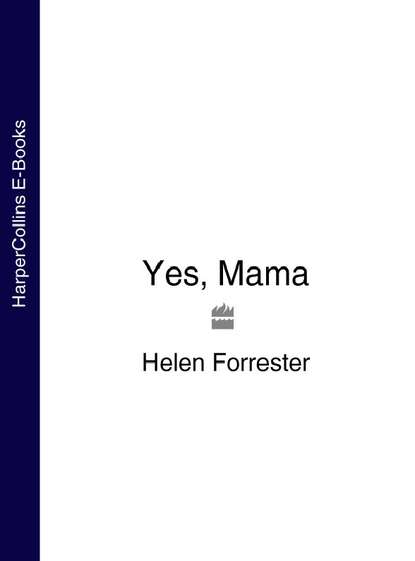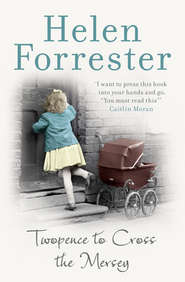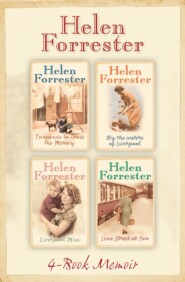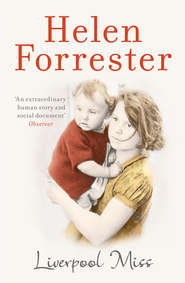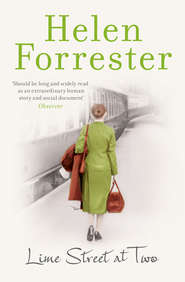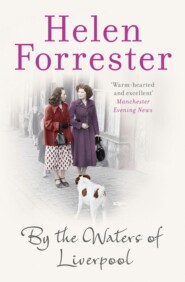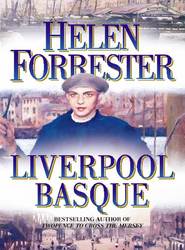По всем вопросам обращайтесь на: info@litportal.ru
(©) 2003-2024.
✖
Yes, Mama
Настройки чтения
Размер шрифта
Высота строк
Поля
‘Doctor from Dispensary might come.’
‘They’ll be shut by now.’
‘Well, first light tomorrer, you go after ’em. Aye, this’ll cause a pile of trouble.’
‘What?’
‘They’ll burn everythin’ you got, to stop it spreadin’.’ She pointed to Bridie, still staring at the blackened rafters above her head and chattering incoherently. ‘They’ll take ’er to the Infirmary no doubt – keep ’er away by herself.’
‘To die by herself?’ James was aghast.
That’s wot ’ospitals is for, int it? To die in.’ She gave a dry, sardonic laugh. ‘They daren’t leave ’er here, ’cos everybody in the court could get it from her.’
‘Christ!’ He rubbed his face with his hands. ‘Are you certain sure?’
‘Aye, I’m sure.’ She hesitated, and then said, ‘Well – almost.’ She looked round the little room, lit only by the candle in her hand, at its dirty brick walls, its earthen floor, its empty firegrate. ‘And you take care o’ yourself and our Bill,’ she warned. ‘Take all your clothes off and wash ’em, and kill every bloody louse and flea you can find. The cleaner you are, the better you’ll be.’ She turned to Mary, and asked, ‘Anybody else bin in here?’
‘Our Theresa and the baby was here. I sent ’em home just now.’ Mary began to cry.
‘Well, you got a copper in your house. You go home and put all your clothes in it – and Theresa’s and the baby’s and our Billy’s and your Dad’s stuff. And boil the lot real hard.’ She looked disparagingly at the fat, rather stupid girl in front of her. ‘And if it’s wool and it can’t be boiled, borrow an iron and iron it well. Go over all the seams – with a good, hot iron, mind you.’
She turned back to Bridie, who periodically was letting out short shrieks. She put her hand on her niece’s forehead again, and then turned to James. ‘See if you can get a bit of milk from somewhere and feed it to her.’ She swung back to Mary and snarled at her, ‘Stop wingeing.’
Mary sniffed and wiped her face with the end of her shawl. She cast a glance of pure hatred at the humped back bent once more over Bridie; witches ought to be burned, in her opinion. Aloud she said, ‘I’ll go and get the fire lit under the copper. Tell our Billy to come straight over to our ’ouse – I’ll do ’im first. While the water’s gettin’ hot, I’ll run back with a bit of conny-onny for Mam.’
Kitty straightened up and sighed. She felt around in her skirt pocket and brought out a penny. ‘Get a pennorth o’ fresh milk, as you go by Mike’s dairy. Conny-onny int goin’ to do her much good.’
With a pout, Mary took the proffered coin, said goodbye to her father and clumped up the steps to the court.
‘I’ll stay for a while,’ the old woman told James, who had moved closer to look anxiously at his tossing wife. ‘Gi’ me a chair, Jamie boy.’
James hastily moved a small stool closer to the bed and she slowly lowered herself on to it. ‘’Ave you got any firing? I could use a cup o’ tea.’
‘Aye, I got some driftwood.’ He took the water bucket up to the court to draw water for tea from the common tap.
Crouched against a wall, Billy had listened dumbly to Great-aunt Kitty’s diagnosis. His mother was his world. Sharp-tongued and quick to slap, nevertheless, she kept the family together. Without her, there was only darkness. Now he crept forward, to ask, ’is she goin’ to die, Aunty?’
His great-aunt looked up at him from her stool, her bloodshot eyes glittering in their black hollows. ‘Coom ’ere, duck.’
The lad moved closer to her, and she put a long bony arm round him. ‘She might,’ she said. ‘She ’asn’t got no strength.’
Billy began to blubber like a small boy, while his mother raved on her bed. ‘Na, then, luv.’ Great-aunt Kitty’s arm tightened round him. ‘There’s a time when all of us has to go. You must pray nobody else gets it.’ She sighed. ‘Your Pa should’ve asked the Dispensary for ’elp before.’
‘Mam didn’t want ’im to. She’s afraid of us all endin’ up in the Workie.’
The very word ‘Workhouse’ was enough to make anybody panic, thought Great-aunt Kitty, so she nodded understandingly.
‘Well she is real ill now, lad, and the Dispensary is the only one what might save her.’
II
Wrapped in a black woollen shawl, her straw hat skewered by two huge hatpins to the top of her plaited hair, Polly ran through the ill-lit city. Though she was by no means young she was nervous in the Woodmans’ neighbourhood of being cornered by half-drunk, smartly dressed men out for an evening’s entertainment; further into the city itself, prostitutes paraded followed closely by their pimps, all of them anxious to defend their own particular territory. As she cut through side streets to reach her home near the junction of Scotland Road and Cazneau Street, homeless men dozing in doorways called to her, and an occasional group of seamen on shore leave shouted after her. She gave them all wide berth.
The narrow street off which the court led was almost dead dark, and she feared she might not find the entrance. As she passed, she let her fingertips brush along the rough brick wall, watching that she did not trip over front steps which occasionally protruded on to the pavement.
A slight difference in the light and nothing under her fingertips told her that she had found the narrow archway.
As she entered, the smell hit her, the appalling reek of the midden full of a month’s rubbish and the overflowing earth lavatories. Very faintly, from the steps leading down to the cellar, came the glow of a candle. She walked lightly towards it, afraid of slipping on the cobblestones, greasy from half a century of filth. Then she ran down the narrow outside staircase and into the room.
Though there were only three of them, the cellar seemed full of women, wrapped in their black, crocheted shawls, all watching tearfully, as her mother on her straw mattress muttered softly. The light of the solitary candle barely reached her father, who was pacing up and down a narrow space by the fireplace. He was beating his breast with one clenched fist, in time to the movement of his feet. Crouched on another palliasse laid on the floor, his head against the wall, Billy dozed, his tousled hair shadowing his face.
Polly’s quick footsteps on the stairs woke the boy, and all heads turned towards her.
Polly had eyes only for her mother, and the women edged back as she ran to the narrow bed and flung herself on her knees by it. ‘Holy Mary!’ she breathed, as she saw the black-encrusted mouth and the frightening staring eyes. She laid her arm round her mother’s head and whispered, ‘Mam.’
Bridie ignored her, and continued to toss and mutter with an occasional near shout.
Polly looked round wildly. ‘Aunty! Aunty Kitty, what’s to do with her? Can’t you do somethin’?’
Perched on her stool like a roosting crow, her great-aunt said heavily, ‘I think it’s gaol fever.’
Polly drew back from the bed in horror. ‘Has anybody bin to the Dispensary to ask the doctor?’
‘Billy’ll go as soon as it’s light – mebbe somebody’ll be there.’ She looked down at the terrified girl. ‘You come away from ’er, duck. You can’t do nothin’, and you might catch it.’
Mary let out a sudden wail, ‘Aye, we’ll all die unless we’re lucky – and our Billy wouldn’t come over and ’ave hisself washed and ’is clothes boiled.’
‘Now, Mary, don’t take on so. Time enough for that later.’ This from Mrs Fox, Bridie’s distant kinswoman and the family’s landlady, who, to her credit, had come down from her ground floor room to see if she could help.
But Bridie was beyond help. She died before midnight in the arms of her old aunt, her half-nourished body unable to withstand the ravages of the terrible disease.
In the first light of morning, as they listened to the unearthly sound of keening coming from the Tysons’ cellar, her Catholic neighbours formed an uneasy knot on the far side of the court; occasionally, one or the other of them would cross themselves.
They whispered questions to each other, and, finally, a woman ran across to the iron railing guarding the cellar steps. She leaned over. Great-aunt Kitty was sitting exhausted on the bottom step, and she asked her, ‘What’s to do?’
The old woman looked up and replied, without hesitation, ‘Typhus, I reckon. It’s our Bridie, dead from typhus.’
The woman flung her hands across her chest, as if to protect herself, her face a picture of horror. ‘Jaysus, save us!’ she screamed.
At her shriek, panic went from face to face. People not yet up leapt from their palliasses to the windows and flung them up, as the woman turned and spread the news. Nobody came near the cellar, tending instead to bunch themselves in the far corners of the foetid yard and draw comfort from excited talk with each other.
James wept unrestrainedly, not only because he had lost his wife, but also because she would have to be given a pauper’s funeral, the last great humiliation.
‘’Aven’t even got a sheet to wind her in,’ he sobbed bitterly. ‘Will they ’ave to strip ’er?’
‘Aye, for their own safety, they’ll have to take everything of ours off ’er and burn it,’ Great-aunt Kitty told him. ‘They’ll bring a shroud, though.’
III





